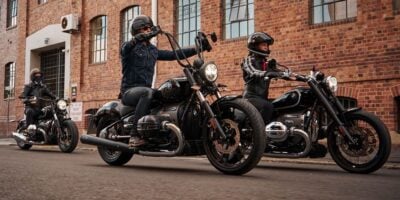For nearly two decades, the three studio LPs and various EPs released in Refused’s heyday have been consigned to history. Not long after the Swedish hardcore kings issued The Shape Of Punk To Come in 1998, they abruptly split up. However, in early 2012, this story sprouted a new chapter. Refused, with core lineup intact, announced they’d be playing that year’s Coachella Festival, followed by a global tour.
After their maiden Australian visit in late 2012, however, Refused made it clear the reunion would soon end, and there were no plans to record more music. But this was nothing but a bluff, as the band’s fourth album Freedom rocketed into view last weekend.
“It was great to play [The Shape Of Punk live] because we realised that stuff feels good,” says drummerDavid Sandström. “But we also discovered that there was a lot of room for improvement, not just in the playing, but there were things that we hadn’t done so well and there was a lot of stuff left unexplored. That process was a part of the inspiration for making new music. Me and Kris [Steen, guitar] would be backstage before a show and we were like, ‘We don’t really have a song that does this.’”
Freedom was recorded in mid-2014, and the band did an exceptional job at keeping it a secret. In fact, there was absolutely no news about the album until late April when Refused unleashed its lead single, ‘Elektra’. On the one hand, ‘Elektra’ is the sound of the Swedish punks taking a hearty step into the future – adding a touch of stadium gloss to their agile, economical hardcore punk. But it also shows they haven’t abandoned their roots, harking back to ’80s thrash and the likes of early-era Soundgarden. Either way, one thing’s for sure: The Shape Of Punk might’ve become an unassailable part of hard rock history, but Refused weren’t interested in making a sequel.
“We sort of feel we need to prove ourselves as a contemporary band now – that there’s a point to us being around,” says Sandström. “It’s perfectly understandable that there’s talk on nostalgia, but it’s a concept that I’m not familiar with. It removes any sense of progress or uncertainty or any type of danger from the artistic process, which just makes things bland.”
The majority of Freedom was tracked in Los Angeles with producer Nick Launay (Nick Cave and The Bad Seeds, Yeah Yeah Yeahs, Midnight Oil). However, the band also teamed up with young Swedish producer Shellback on two tracks, including ‘Elektra’. Given that Shellback made his name writing and producing songs for the likes of Taylor Swift, Maroon 5, Lily Allen and Pink, it was a most unlikely partnership.
“In July [last year] we basically felt we had the songs written,” says Sandström. “So me and Kris were like, ‘Maybe we should let someone listen to this before we go to LA to record.’ We’d met Shellback and it turns out that he grew up listening to Refused and playing in metal/hardcore bands. So we just hit it off, and then, because he has a pop sensibility, we thought it would be interesting to see what he said about the songs.
“We were getting ready to go to LA and suddenly I just get this email where one of the songs that we’d sent him – which was a six-and-a-half-minute mammoth – he’d done his own version of it, recorded drums, bass and guitar in his own studio, and it was two-and-a-half minutes long. We immediately thought that it was a better version than our song.
“The process in LA was brilliant, but when we got back home, we realised that particular song, ‘Elektra’, we hadn’t nailed it. So we decided to re-record the whole song back in Stockholm, and we had asked Shellback to produce it.”
As odd as it seems, the decision to work with Shellback wasn’t made flippantly. In truth, Refused weren’t going to welcome anyone into their creative world unless they saw some constructive benefit. Launay has decades of experience working with fiercely independent rock bands, and he excels at preserving individual quirks while also capturing an energetic, tactile sound.
“We’re sort of an eclectic rock band,” says Sandström. “We have somewhat disparate influences – there might be a vibe of early speed metal, early Slayer to some songs, and then there’s elements of hip hop on another song, and then there’s some almost classic rock, Jimi Hendrix vibe somewhere. We sort of felt like we would need someone sort of old-school that could give us a consistent sound throughout the record.”
For a record made in 1998, The Shape Of Punk To Come has aged exceptionally well. Unlike many big albums made at that time, the instrument sounds are quite organic, which allows the record to continue to recruit fans today. Sandström and Steen spearheaded the Shape Of Punk recording sessions, but this time around, they couldn’t argue with Launay’s sonic vision. “He just thinks about things in a special way,” Sandström says. “It seemed he was on a whole other level. I hardly understood a lot of the choices he made, but as soon as we listened back to stuff, we felt that he was consistently making the right decisions.”


































